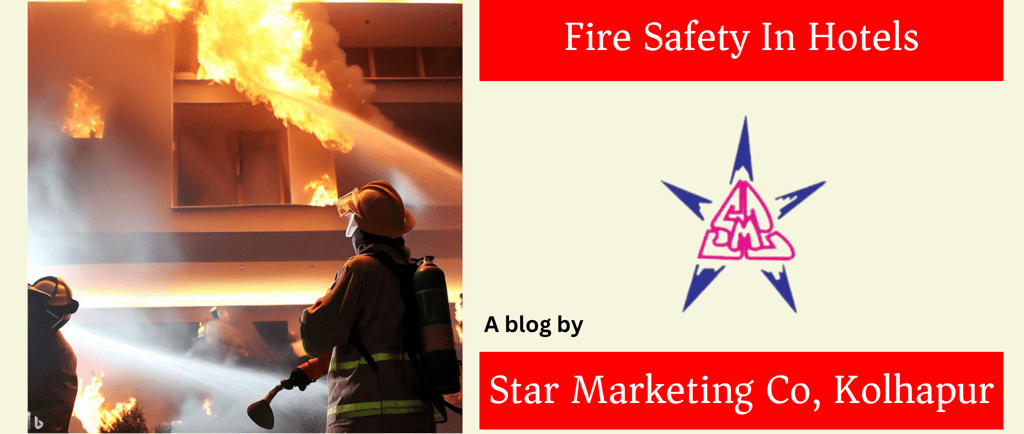Fire Safety In Hotels
Ensuring Fire Safety in Hotels: Essential Measures and Technologies


Fire Safety In Hotels
Fire safety in hotels is a critical aspect of ensuring the well-being and security of guests and staff. A well-designed and executed fire protection service, incorporating various fire safety measures, can significantly reduce the risk of fire-related incidents in hotels. This article explores the importance of fire safety in hotels and examines essential measures and technologies, such as fire extinguishers, fire NOC, fire installation systems, sprinklers, and alarm systems, to enhance the overall fire safety preparedness of hotels.
1. Understanding the Importance of Fire Safety in Hotels
Hotels are bustling places, with numerous activities occurring simultaneously. With the presence of guests and staff in large numbers, the potential risk of a fire incident becomes significantly higher. A fire outbreak in a hotel can lead to devastating consequences, such as loss of life, injuries, property damage, and reputation damage for the hotel. Therefore, it is imperative to implement comprehensive fire safety measures to safeguard the lives of occupants and protect the hotel's assets.
2. Fire Extinguishers: First Line of Defense
Fire extinguishers are an integral component of any fire protection service in hotels. They are the first line of defense against small, incipient fires that can be controlled before they escalate into larger emergencies. Hotels must have strategically placed fire extinguishers in easily accessible locations throughout the property. Staff should be trained to use the appropriate type of extinguisher based on the class of fire, such as Class A, B, C, or K.
3. Fire NOC (No Objection Certificate)
Obtaining a Fire NOC from the local fire department is mandatory for hotels. This certificate ensures that the hotel complies with fire safety regulations and that all necessary fire safety measures are in place. Fire authorities inspect the hotel premises to verify that fire exits, fire extinguishers, sprinkler systems, and alarm systems are correctly installed and functional.
4. Fire Installation Systems
Fire installation systems encompass a range of equipment and technologies designed to detect and combat fires effectively. These systems are vital for early fire detection and suppression. Some key components include:
a. Sprinkler Systems: Automatic sprinkler systems are an essential part of fire safety in hotels. They respond rapidly to the presence of heat and discharge water, controlling the spread of fire and creating a safer environment for evacuation.
b. Smoke Detection Systems: Smoke detectors are crucial for early fire detection. These systems identify the presence of smoke and trigger alarms, providing occupants with sufficient time to evacuate safely.
c. Fire Hydrants and Hose Reels: Fire hydrants and hose reels provide firefighters with a reliable source of water to combat fires swiftly and effectively.
d. Gas Suppression Systems: In areas with sensitive equipment or where water may damage assets, gas suppression systems can be utilized. These systems extinguish fires by reducing the oxygen concentration in the area, thereby depriving the fire of fuel.
5. Sprinkler Systems: An Indispensable Lifesaver
Sprinkler systems have proven to be lifesavers in hotel fire incidents. The National Fire Protection Association (NFPA) reports that properties with functioning sprinkler systems experience an 80% reduction in the rate of civilian fire deaths. These systems respond quickly to fire heat, discharging water directly at the source of the fire, preventing it from spreading and allowing guests and staff to evacuate safely.
6. Alarm Systems: Alerting Occupants to Danger
An efficient fire alarm system is vital for hotels, as it quickly alerts occupants in case of a fire emergency. Audible and visible alarms should be installed throughout the hotel, including guest rooms, hallways, common areas, and back-of-house areas. Regular testing and maintenance of the alarm system are crucial to ensure its reliability.
7. Fire Safety Training for Staff
Properly trained staff can make all the difference during a fire emergency. Hotels should conduct regular fire safety training sessions for their employees. Training should include fire evacuation procedures, proper use of fire extinguishers, location of emergency exits, and communication protocols during a fire incident.
8. Importance of Emergency Evacuation Plans
A well-designed emergency evacuation plan is a crucial aspect of fire safety in hotels. Guests and staff should be familiar with evacuation routes, assembly points, and emergency contacts. Regular drills should be conducted to practice evacuation procedures and identify any areas for improvement.
9. Compliance with Building Codes and Standards
Adhering to local building codes and fire safety standards is non-negotiable for hotels. Regular inspections by fire authorities should be welcomed, as they ensure the hotel's compliance with safety regulations and provide valuable feedback for improvement.
10. Integration of Fire Safety Systems
An integrated fire safety system enhances the overall effectiveness of fire protection service in hotels. Integration allows various fire safety components, such as sprinklers, smoke detectors, and alarm systems, to communicate and collaborate seamlessly during an emergency. This results in quicker response times and better control over the fire incident.
Conclusion
Fire safety in hotels is a matter of utmost importance, given the potential risks and consequences of fire-related incidents. Implementing comprehensive fire protection service and safety measures, including fire extinguishers, fire NOC, fire installation systems, sprinklers, and alarm systems, significantly enhances the hotel's ability to prevent, detect, and respond to fire emergencies. By prioritizing fire safety and investing in the right technologies, hotels can create a secure environment for their guests and staff, ensuring peace of mind and protection against fire hazards.
